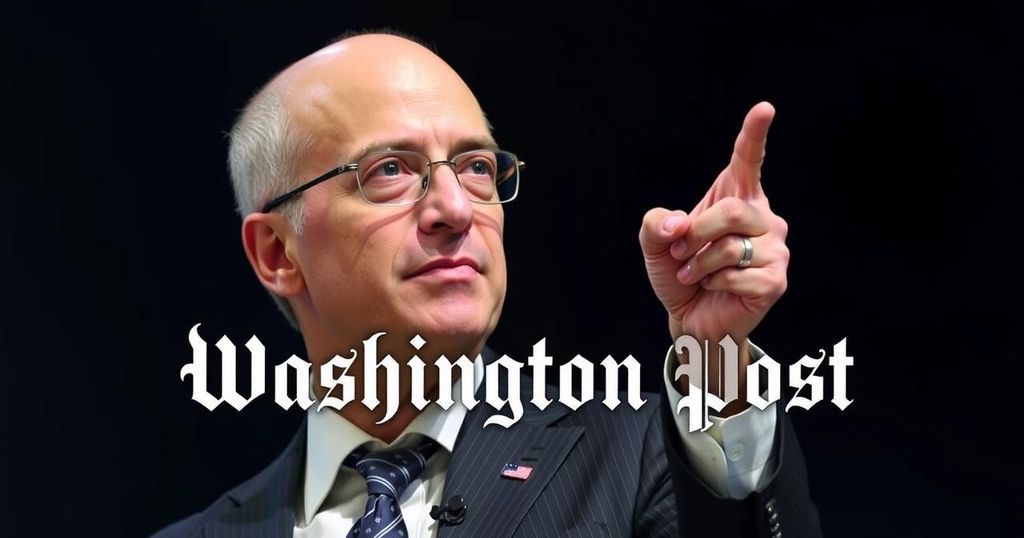Bezos Defends The Washington Post’s No-Endorsement Policy

Jeff Bezos has defended The Washington Post’s decision to discontinue presidential endorsements, asserting that such endorsements foster perceptions of bias. Despite backlash and significant subscriber losses, he maintains that the move is principled and necessary. The newspaper’s internal dissent regarding this policy highlights tensions within its journalistic community.
Jeff Bezos, the owner of The Washington Post, has publicly defended the newspaper’s recent decision to refrain from endorsing any presidential candidates, a move that has sparked considerable backlash, including the cancellation of 200,000 digital subscriptions. This decision, reported by National Public Radio (NPR), halted a planned endorsement of Democratic candidate Kamala Harris, leading to customer dissatisfaction directed towards Bezos himself. In an opinion piece published in The Washington Post, Bezos articulated that the act of endorsing presidential candidates can foster a perception of bias in the media, undermining its credibility. He expressed, “What presidential endorsements actually do is create a perception of bias.” Bezos further insisted that the decision to end endorsements is both principled and necessary. Critics have questioned the timing of the decision, given its proximity to Election Day, positing that Bezos may be seeking to mitigate any potential hostility from Republican candidate Donald Trump should he win the presidency. Bezos asserted that no candidates were privy to the decision and that there was no quid pro quo involved; he also stated there was no connection between this decision and a subsequent meeting between Trump and senior officials of Blue Origin. William Lewis, the publisher and CEO of The Washington Post, affirmed that the newspaper would refrain from endorsing candidates in this and future elections, declaring a return to its foundational principles of non-endorsement. The Washington Post, renowned for its investigative journalism, including coverage of the Pentagon Papers and the Watergate scandal, has been awarded 76 Pulitzer Prizes. Nevertheless, the decision has caused unrest among its journalists, with approximately 20 columnists expressing their dissent via opinion columns on the newspaper’s platform and some resigning in protest, stating that the lack of endorsement represents a deviation from the publication’s core editorial values. This pivot comes shortly after the Los Angeles Times also opted not to endorse candidates, acknowledging that similar decisions have resulted in substantial subscriber losses. Thus, while Bezos’s rationale highlights a desire to maintain journalistic integrity and independence, the ramifications of this choice on subscriber loyalty and internal dissent among The Washington Post’s staff are significant and warrant close observation.
The discussion surrounding media bias and the role of endorsements in political elections has been a contentious issue for many years. Newspapers traditionally have provided endorsements to influence their readership’s decisions during elections. However, in recent years, there has been a growing concern regarding the perception of bias that such endorsements may create. The Washington Post’s historical legacy of investigative journalism has elevated it to a respected position in American media. Still, shifts in editorial policy, such as the decision not to endorse a candidate, can evoke strong reactions both from the public and from within the organization. The implications of this decision, particularly amid political polarization, raise questions about the credibility and ethical responsibilities of media outlets in the current landscape.
In conclusion, Jeff Bezos’s defense of The Washington Post’s decision to stop endorsing presidential candidates underscores a significant shift in the newspaper’s editorial policy aimed at preserving credibility and independence. While there may be valid reasons for this decision, it has led to a backlash from subscribers and dissent among journalists, reflecting the complexities of media influence in politics and the need for newspapers to navigate their roles carefully. As political dynamics evolve, media outlets must continuously assess their impact and ethical obligations to maintain public trust.
Original Source: www.aljazeera.com








